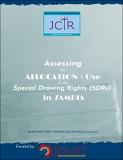Assessing the Allocation and Use of the Special Drawing Rights in Zambia
Date
2022-11-30Author
Jesuit Centre for Theological Reflection
Item Usage Stats
69
views
views
17
downloads
downloads
Abstract
In August 2021, the International Monetary Fund (IMF) allocated by far the largest allocation to date of Special Drawing Rights (SDRs) amounting to SDR 456.5 billion (equivalent to about US$650 billion). This allocation was to address the long-term global need for reserves, build confidence, foster the resilience and stability of the global economy and help countries cope with the impact of the COVID-19 pandemic. At the time of this allocation, most countries in Africa were facing serious economic challenges which were exacerbated by the effects of the Covid-19 Pandemic. External financing to help the African continent recover was not available because most of the countries in Europe, North America and even China itself were trying to solve economic woes of their own which the pandemic had inflicted on their respective economies. Therefore, the IMF allocation of the 2021 SDRs provided much needed financing for African countries which had no other alternative ways to finance their way out of the Covid-19 Pandemic. Like many other countries around the world, Zambia was also affected by the Corona Virus and its impact on the Zambian economy was quite devastating. Many sectors of the economy were shut down and this meant that very little economic activity was carried out during this time. The health sector was overwhelmed as global supply chains were disrupted and struggled to meet the demand for basics such as personal protective equipment (PPE). This also led to the shortage of other drugs in hospitals and health centres across the country. The tourism sector was among the hardest hit sectors as international travel came to a halt. Leisure and hospitality businesses also suffered greatly during the economic shutdowns. Even when restaurants were operating on takeaway basis, they could not make enough money to survive through the pandemic.
This report assesses the allocation and use of the Special Drawing Rights (SDRs) in Zambia. It looks at how the Zambian Government spent its SDRs and the sectors of the economy which benefited from the SDRs. The report also shows how the recipient ministries and institutions spent their allocated SDRs.

